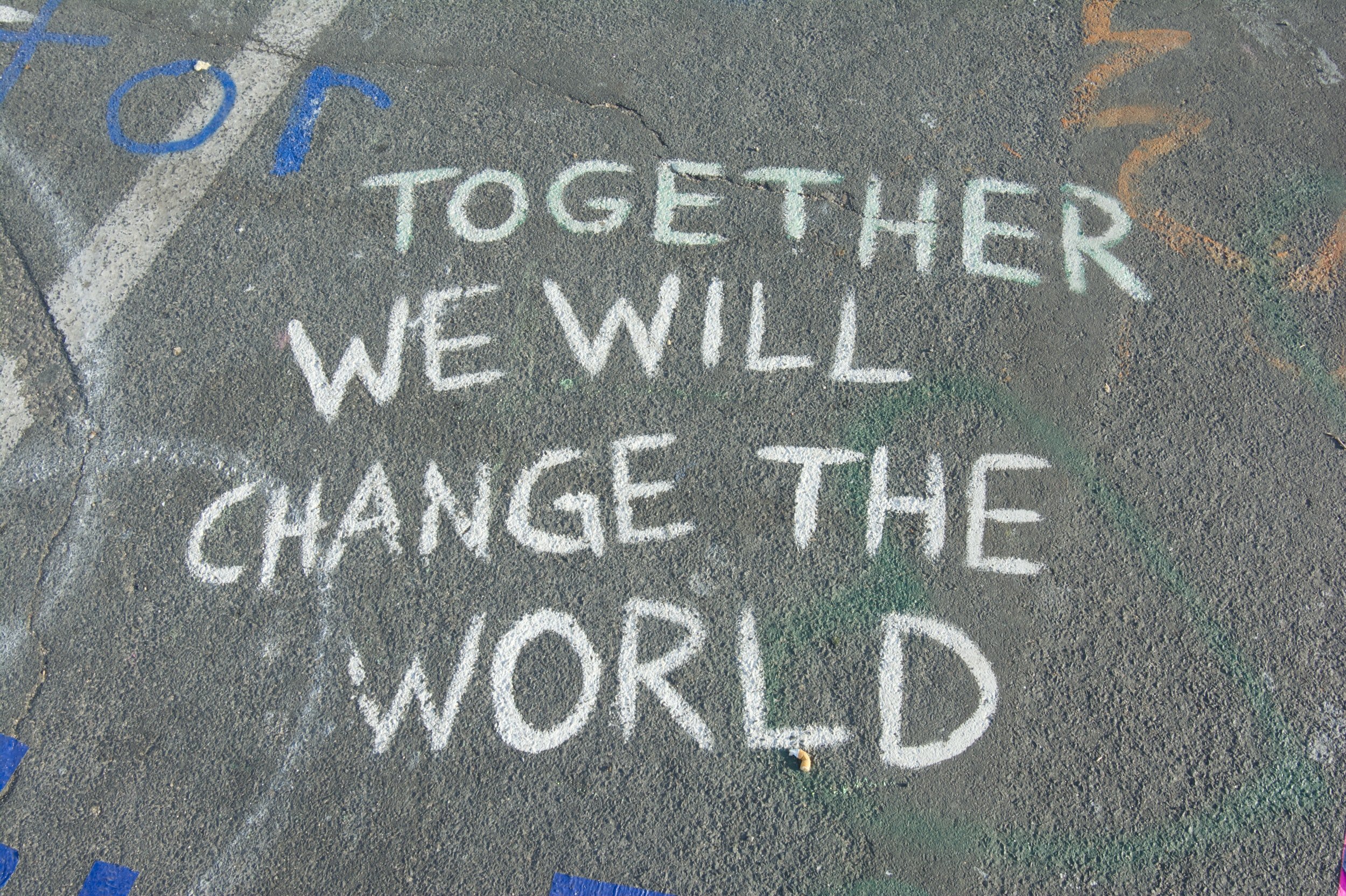
Health Equity Scholars
Program Schedule

Final Gathering
The purpose of the final gathering is to reflect on community organizing as a craft, art, and vocation. We will also hear from everyone about what they have learned from participating in the program. What have we learned about ourselves as health equity advocates and organizers? What's next?

Module 6 - LGBTQ Health
We will review key elements of providing inclusive, affirming care to LGBTQ patients and the health inequities faced by LGBTQ communities. This module will be grounded in the history and current trends of LGBTQ health and healthcare in the United States. We will use case studies to discuss how interprofessional healthcare providers can advocate for their LGBTQ patients and organize around LGBTQ healthcare issues.
Learning Objectives:
Review key elements of inclusive, affirming care for LGBTQ patients
Explain the root causes of LGBTQ health inequities and the role that intersectionality plays in these inequities
Describe the history of LGBTQ health care and current policies that prevent LGBTQ patients from accessing care
Discuss the role of interprofessional healthcare providers as advocates for their LGBTQ patients

Module 5 - Immigration & Health
In this session, we will dive more deeply into a particular topic, immigration in the US, to explore the complexities of how an understanding of social determinants of health affect patients and health care and how an equity-based approach can inform our work at the clinical, institutional, and policy levels.
Learning objectives:
Articulate how immigration status can affect an individual patient’s health and interactions with the health care system.
Describe ways health providers can improve health outcomes for their immigrant patients in the clinic.
Describe how health providers can create institutional structures that better serve immigrant patients and advocate for policies that do not harm the health of immigrant patients.
Lead faculty: Laura Janneck and Lara Jirmanus

Immersion Day 2 - Climate Health & Justice
Climate change is the phenomenon in which greenhouse gas emissions from the burning of fossil fuels have caused unnatural warming of our atmosphere from heat-trapping gases. This has profoundly important consequences for health and health equity. In this session, we provide an orientation to climate change and health equity and describe the advocacy roles that health professionals can play. We will also explore the social and political forces that enabled this crisis and prevent the implementation of solutions.
Learning Objectives:
Describe climate change and its implications on health and health equity
Describe the roles health professionals can play as an advocate
Explore the social and political factors that enabled the climate crisis and prevent the implementation of solutions
Lead faculty: Gaurab Basu

Immersion Day 1 - Racism & Health
Racism negatively impacts health outcomes and healthcare delivery. In this session, we will name racism and how racism makes people sick. We will also seek to understand the ways in which we, as health professionals, can strategize to act.
Learning Objectives:
Define racism
Name the ways in which racism shows up in healthcare and understand how racism contributes to poor health outcomes
Learn how we can be anti-racist healthcare professionals
Lead faculty: Camila Mateo

Module 4 - Strategy: Tactics & Action
The strategy is how we turn what we have into what we need to get what we want: resources into the ability to achieve a goal. It is a way to analytically imagine how to achieve our goals under conditions of high uncertainty. This month’s objectives include:
Learn how to strategize turning what you have (resources) into what you need (power) to get what you want (outcomes)
Learn the practice of strategic deliberation and decision-making in both analytic and imaginative ways for your project
Lead Faculty: Pedja Stojicic

Module 3 - Leading Organizational Transformation Towards Health Equity
In this module, Scholars will explore strategies to lead and support organizational/institutional change and transformation. We will explore specific types of institutional transformation and cases that lead toward a more sustainable commitment to health equity.
At the end of this module, scholars will be able to:
Analyze and plan how to support an institutional transformation that will lead toward more robust support for their project
Make a clear connection between practices of community organizing and institutional transformation
Crowdsource resources, ideas, and strategies for creating a workplace environment that supports health equity in general

Module 2 - Narrative Leadership (Story of Us & Now)
Public Narrative is a leadership art that draws on the power of storytelling to motivate others to join us in taking action. We have all made choices that shaped our life’s path—how we responded to challenges, how we joined groups or took leadership, finding the courage to take risks.
Scholars will learn:
How to create a shared narrative that will inspire a sense of belonging and connection
How to craft stories that create urgency for people to take action

Module 1 - Relationships Building
Organizers build relationships among constituency members to create a commitment to a common purpose. Through our relationships, we can understand our purposes and shared values and develop resources to act upon them.
Objectives this month include:
Examine why relationships are the foundation of our work
Practice how to build public relationships through one-to-one meetings

Online Launch (Day 2) - Health Equity Project Strategy
During the second day of the Online Launch, we will focus on developing a specific and focused strategy for scholars’ health equity projects and learn practices of effective team formation.
Learning objectives are:
Integrate community organizing strategy and theory of change principles into scholars’ health equity projects
Discover and apply basic practices of effective team formation
Review and commit to health equity project timelines

Online Launch (Day 1) - Intro to Community Organizing
Health Equity Scholars Online Launch is a foundational event for the whole program.
During the first day, we will have a chance to:
Introduce the program curriculum and flow
Get to know each other and create a solid foundation for our work
Learn about Public Narrative and share (Stories of Self)
Explore community organizing key principles & practices

Final Gathering
The purpose of the final gathering is to reflect on community organizing as a craft, art, and vocation. We will also hear from everyone about what they have learned from participating in the program. What have we learned about ourselves as health equity advocates and organizers? What's next?

Module 6 - LGBTQ Health
We will review key elements of providing inclusive, affirming care to LGBTQ patients and the health inequities faced by LGBTQ communities. This module will be grounded in the history and current trends of LGBTQ health and healthcare in the United States. We will use case studies to discuss how interprofessional healthcare providers can advocate for their LGBTQ patients and organize around LGBTQ healthcare issues.
Learning Objectives:
Review key elements of inclusive, affirming care for LGBTQ patients
Explain the root causes of LGBTQ health inequities and the role that intersectionality plays in these inequities
Describe the history of LGBTQ health care and current policies that prevent LGBTQ patients from accessing care
Discuss the role of interprofessional healthcare providers as advocates for their LGBTQ patients

Module 5 - Immigration & Health
In this session, we will dive more deeply into a particular topic, immigration in the US, to explore the complexities of how an understanding of social determinants of health affect patients and health care and how an equity-based approach can inform our work at the clinical, institutional, and policy levels.
Learning objectives:
Articulate how immigration status can affect an individual patient’s health and interactions with the health care system.
Describe ways health providers can improve health outcomes for their immigrant patients in the clinic.
Describe how health providers can create institutional structures that better serve immigrant patients and advocate for policies that do not harm the health of immigrant patients.
Lead faculty: Laura Janneck and Lara Jirmanus

Immersion Day 2 - Climate Health & Justice
Climate change is the phenomenon in which greenhouse gas emissions from the burning of fossil fuels have caused unnatural warming of our atmosphere from heat-trapping gases. This has profoundly important consequences for health and health equity. In this session, we provide an orientation to climate change and health equity and describe the advocacy roles that health professionals can play. We will also explore the social and political forces that enabled this crisis and prevent the implementation of solutions.
Learning Objectives:
Describe climate change and its implications on health and health equity
Describe the roles health professionals can play as an advocate
Explore the social and political factors that enabled the climate crisis and prevent the implementation of solutions
Lead faculty: Gaurab Basu

Immersion Day 1 - Racism & Health
Racism negatively impacts health outcomes and healthcare delivery. In this session, we will name racism and how racism makes people sick. We will also seek to understand the ways in which we, as health professionals, can strategize to act.
Learning Objectives:
Define racism
Name the ways in which racism shows up in healthcare and understand how racism contributes to poor health outcomes
Learn how we can be anti-racist healthcare professionals
Lead faculty: Camila Mateo

Module 4 - Strategy: Tactics & Action
The strategy is how we turn what we have into what we need to get what we want: resources into the ability to achieve a goal. It is a way to analytically imagine how to achieve our goals under conditions of high uncertainty. This month’s objectives include:
Learn how to strategize turning what you have (resources) into what you need (power) to get what you want (outcomes)
Learn the practice of strategic deliberation and decision-making in both analytic and imaginative ways for your project
Lead Faculty: Pedja Stojicic

Module 3 - Leading Organizational Transformation Towards Health Equity
In this module, Scholars will explore strategies to lead and support organizational/institutional change and transformation. We will explore specific types of institutional transformation and cases that lead toward a more sustainable commitment to health equity.
At the end of this module, scholars will be able to:
Analyze and plan how to support an institutional transformation that will lead toward more robust support for their project
Make a clear connection between practices of community organizing and institutional transformation
Crowdsource resources, ideas, and strategies for creating a workplace environment that supports health equity in general

Module 2 - Narrative Leadership (Story of Us & Now)
Public Narrative is a leadership art that draws on the power of storytelling to motivate others to join us in taking action. We have all made choices that shaped our life’s path—how we responded to challenges, how we joined groups or took leadership, finding the courage to take risks.
Scholars will learn:
How to create a shared narrative that will inspire a sense of belonging and connection
How to craft stories that create urgency for people to take action

Module 1 - Relationships Building
Organizers build relationships among constituency members to create a commitment to a common purpose. Through our relationships, we can understand our purposes and shared values and develop resources to act upon them.
Objectives this month include:
Examine why relationships are the foundation of our work
Practice how to build public relationships through one-to-one meetings

Online Launch (Day 2) - Health Equity Project Strategy
During the second day of the Online Launch, we will focus on developing a specific and focused strategy for scholars’ health equity projects and learn practices of effective team formation.
Learning objectives are:
Integrate community organizing strategy and theory of change principles into scholars’ health equity projects
Discover and apply basic practices of effective team formation
Review and commit to health equity project timelines

Online Launch (Day 1) - Intro to Community Organizing
Health Equity Scholars Online Launch is a foundational event for the whole program.
During the first day, we will have a chance to:
Introduce the program curriculum and flow
Get to know each other and create a solid foundation for our work
Learn about Public Narrative and share (Stories of Self)
Explore community organizing key principles & practices
